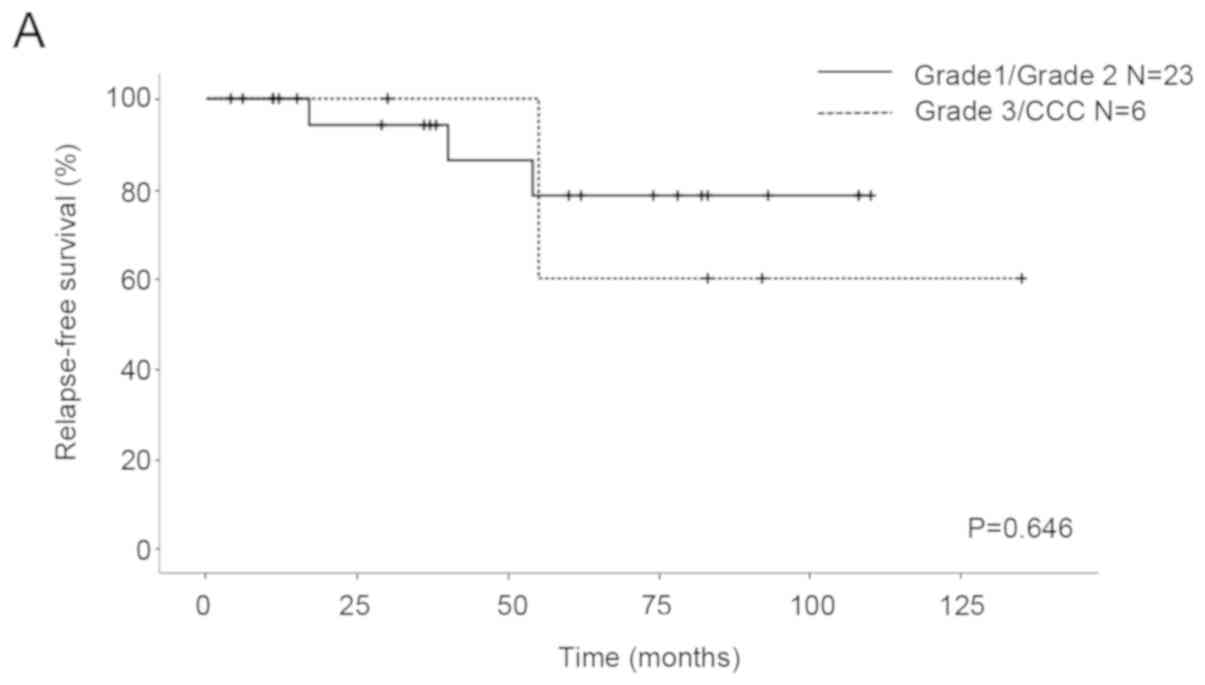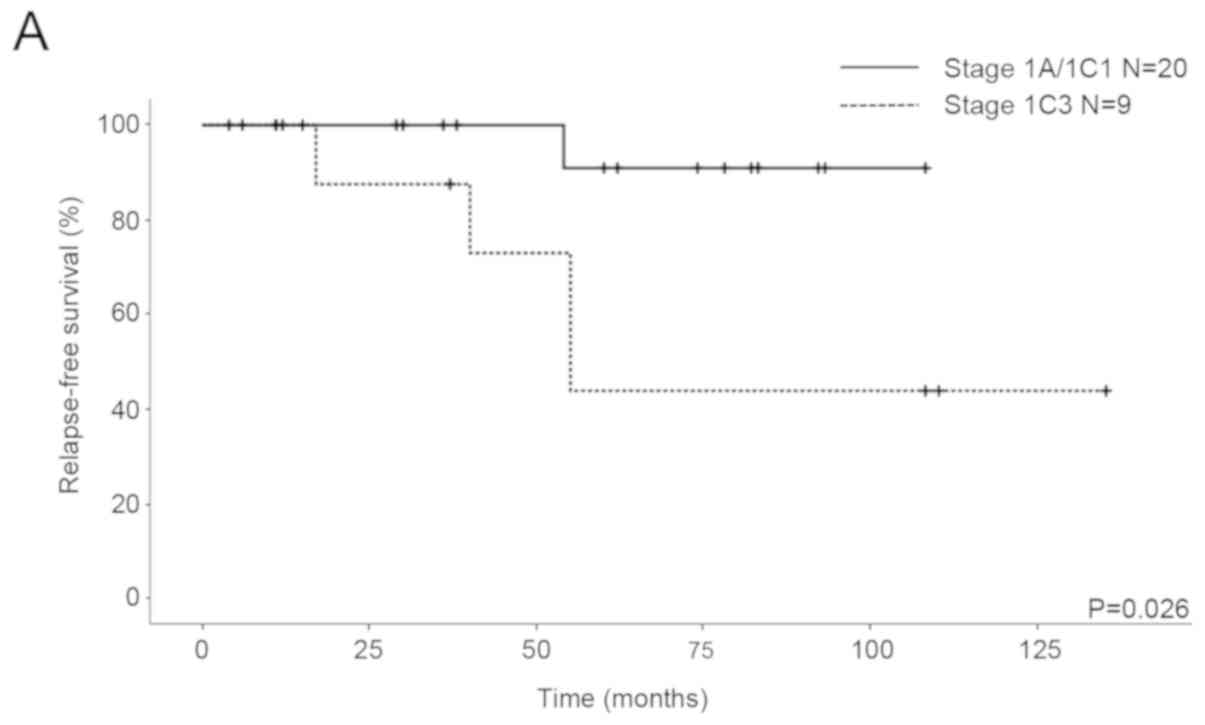|
1
|
Nasioudis D, Chapman-Davis E, Frey MK,
Witkin SS and Holcomb K: Could fertility-sparing surgery be
considered for women with early stage ovarian clear cell carcinoma?
J Gynecol Oncol. 28:e712017. View Article : Google Scholar : PubMed/NCBI
|
|
2
|
Yin J, Wang Y, Shan Y, Li Y, Jin Y and Pan
L: Pregnancy and oncologic outcomes of early stage low grade
epithelial ovarian cancer after fertility sparing surgery: A
retrospective study in one tertiary hospital of China. J Ovarian
Res. 12:442019. View Article : Google Scholar : PubMed/NCBI
|
|
3
|
Eftekhar M, Pourmasumi S and Karimi-Zarchi
M: Preservation of ovarian function during chemotherapy and
radiotherapy in young women with malignancies. Iran J Reprod Med.
12:377–382. 2014.PubMed/NCBI
|
|
4
|
Morgan RJ Jr, Armstrong DK, Alvarez RD,
Bakkum-Gamez JN, Behbakht K, Chen LM, Copeland L, Crispens MA,
DeRosa M, Dorigo O, et al: Ovarian cancer, version 1.2016, NCCN
clinical practice guidelines in oncology. J Natl Compr Canc Netw.
14:1134–1163. 2016. View Article : Google Scholar : PubMed/NCBI
|
|
5
|
Ledermann JA, Raja FA, Fotopoulou C,
Gonzalez-Martin A, Colombo N and Sessa C; ESMO Guidelines Working
Group, : Newly diagnosed and relapsed epithelial ovarian carcinoma:
ESMO clinical practice guidelines for diagnosis, treatment and
follow-up. Ann Oncol. 24 (Suppl 6):vi24–vi32. 2013. View Article : Google Scholar : PubMed/NCBI
|
|
6
|
Fruscio R, Corso S, Ceppi L, Garavaglia D,
Garbi A, Floriani I, Franchi D, Cantù MG, Bonazzi CM, Milani R, et
al: Conservative management of early-stage epithelial ovarian
cancer: Results of a large retrospective series. Ann Oncol.
24:138–144. 2013. View Article : Google Scholar : PubMed/NCBI
|
|
7
|
Schlaerth AC, Chi DS, Poynor EA, Barakat
RR and Brown CL: Long-term survival after fertility-sparing surgery
for epithelial ovarian cancer. Int J Gynecol Cancer. 19:1199–1204.
2009. View Article : Google Scholar : PubMed/NCBI
|
|
8
|
Melamed A, Rizzo AE, Nitecki R, Gockley
AA, Bregar AJ, Schorge JO, Del Carmen MG and Rauh-Hain JA:
All-cause mortality after fertility-sparing surgery for stage I
epithelial ovarian cancer. Obstet Gynecol. 130:71–79. 2017.
View Article : Google Scholar : PubMed/NCBI
|
|
9
|
Ditto A, Martinelli F, Lorusso D, Haeusler
E, Carcangiu M and Raspagliesi F: Fertility sparing surgery in
early stage epithelial ovarian cancer. J Gynecol Oncol. 25:320–327.
2014. View Article : Google Scholar : PubMed/NCBI
|
|
10
|
Park JY, Kim DY, Suh DS, Kim JH, Kim YM,
Kim YT and Nam JH: Outcomes of fertility-sparing surgery for
invasive epithelial ovarian cancer: Oncologic safety and
reproductive outcomes. Gynecol Oncol. 110:345–353. 2008. View Article : Google Scholar : PubMed/NCBI
|
|
11
|
Sugiyama T, Kamura T, Kigawa J, Terakawa
N, Kikuchi Y, Kita T, Suzuki M, Sato I and Taguchi K: Clinical
characteristics of clear cell carcinoma of the ovary: A distinct
histologic type with poor prognosis and resistance to
platinum-based chemotherapy. Cancer. 88:2584–2589. 2000. View Article : Google Scholar : PubMed/NCBI
|
|
12
|
American College of Obstetricians and
Gynecologists: ACOG practice bulletin. Management of adnexal
masses. Obstet Gynecol. 110:201–214. 2007. View Article : Google Scholar : PubMed/NCBI
|
|
13
|
Jiang X, Yang J, Yu M, Xie W, Cao D, Wu M,
Pan L, Huang H, You Y and Shen K: Oncofertility in patients with
stage I epithelial ovarian cancer: Fertility-sparing surgery in
young women of reproductive age. World J Surg Oncol. 15:1542017.
View Article : Google Scholar : PubMed/NCBI
|
|
14
|
Bentivegna E, Gouy S, Maulard A, Pautier
P, Leary A, Colombo N and Morice P: Fertility-sparing surgery in
epithelial ovarian cancer: A systematic review of oncological
issues. Ann Oncol. 27:1994–2004. 2016. View Article : Google Scholar : PubMed/NCBI
|
|
15
|
Satoh T, Hatae M, Watanabe Y, Yaegashi N,
Ishiko O, Kodama S, Yamaguchi S, Ochiai K, Takano M, Yokota H, et
al: Outcomes of fertility-sparing surgery for stage I epithelial
ovarian cancer: A proposal for patient selection. J Clin Oncol.
28:1727–1732. 2010. View Article : Google Scholar : PubMed/NCBI
|
|
16
|
Kajiyama H, Shibata K, Mizuno M, Hosono S,
Kawai M, Nagasaka T and Kikkawa F: Fertility-sparing surgery in
patients with clear-cell carcinoma of the ovary: Is it possible?
Hum Reprod. 26:3297–3302. 2011. View Article : Google Scholar : PubMed/NCBI
|
|
17
|
Ahmed FY, Wiltshaw E, A'Hern RP, Nicol B,
Shepherd J, Blake P, Fisher C and Gore ME: Natural history and
prognosis of untreated stage I epithelial ovarian carcinoma. J Clin
Oncol. 14:2968–2975. 1996. View Article : Google Scholar : PubMed/NCBI
|
|
18
|
Sjövall K, Nilsson B and Einhorn N:
Different types of rupture of the tumor capsule and the impact on
survival in early ovarian carcinoma. Int J Gynecol Cancer.
4:333–336. 1994. View Article : Google Scholar : PubMed/NCBI
|
|
19
|
Prat J; FIGO Committee on Gynecologic
Oncology, : Staging classification for cancer of the ovary,
fallopian tube, and peritoneum. Int J Gynaecol Obstet. 124:1–5.
2014. View Article : Google Scholar : PubMed/NCBI
|
|
20
|
Rosendahl M, Høgdall CK and Mosgaard BJ:
Restaging and survival analysis of 4036 ovarian cancer patients
according to the 2013 FIGO classification for ovarian, fallopian
tube, and primary peritoneal cancer. Int J Gynecol Cancer.
26:680–687. 2016. View Article : Google Scholar : PubMed/NCBI
|
|
21
|
Suh DH, Kim TH, Kim JW, Kim SY, Kim HS,
Lee TS, Chung HH, Kim YB, Park NH and Song YS: Improvements to the
FIGO staging for ovarian cancer: Reconsideration of lymphatic
spread and intraoperative tumor rupture. J Gynecol Oncol.
24:352–358. 2013. View Article : Google Scholar : PubMed/NCBI
|
|
22
|
Zapardiel I, Diestro MD and Aletti G:
Conservative treatment of early stage ovarian cancer: Oncological
and fertility outcomes. Eur J Surg Oncol. 40:387–393. 2014.
View Article : Google Scholar : PubMed/NCBI
|
|
23
|
Marpeau O, Schilder J, Zafrani Y, Uzan C,
Gouy S, Lhommé C and Morice P: Prognosis of patients who relapse
after fertility-sparing surgery in epithelial ovarian cancer. Ann
Surg Oncol. 15:478–483. 2008. View Article : Google Scholar : PubMed/NCBI
|
|
24
|
Groen RS, Gershenson DM and Fader AN:
Updates and emerging therapies for rare epithelial ovarian cancers:
One size no longer fits all. Gynecol Oncol. 136:373–383. 2015.
View Article : Google Scholar : PubMed/NCBI
|
|
25
|
Bentivegna E, Fruscio R, Roussin S, Ceppi
L, Satoh T, Kajiyama H, Uzan C, Colombo N, Gouy S and Morice P:
Long-term follow-up of patients with an isolated ovarian recurrence
after conservative treatment of epithelial ovarian cancer: Review
of the results of an international multicenter study comprising 545
patients. Fertil Steril. 104:1319–1324. 2015. View Article : Google Scholar : PubMed/NCBI
|
|
26
|
Morice P, Wicart-Poque F, Rey A, El-Hassan
J, Pautier P, Lhommé C, de Crevosier R, Haie-Meder C, Duvillard P
and Castaigne D: Results of conservative treatment in epithelial
ovarian carcinoma. Cancer. 92:2412–2418. 2001. View Article : Google Scholar : PubMed/NCBI
|
|
27
|
Morice P, Camatte S, El Hassan J, Pautier
P, Duvillard P and Castaigne D: Clinical outcomes and fertility
after conservative treatment of ovarian borderline tumors. Fertil
Steril. 75:92–96. 2001. View Article : Google Scholar : PubMed/NCBI
|
|
28
|
Zanetta G, Chiari S, Rota S, Bratina G,
Maneo A, Torri V and Mangioni C: Conservative surgery for stage I
ovarian carcinoma in women of childbearing age. Br J Obstet
Gynaecol. 104:1030–1035. 1997. View Article : Google Scholar : PubMed/NCBI
|
|
29
|
Benjamin I, Morgan MA and Rubin SC: Occult
bilateral involvement in stage I epithelial ovarian cancer. Gynecol
Oncol. 72:288–291. 1999. View Article : Google Scholar : PubMed/NCBI
|
















